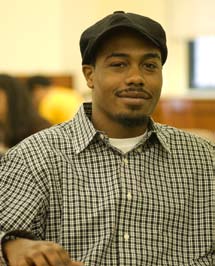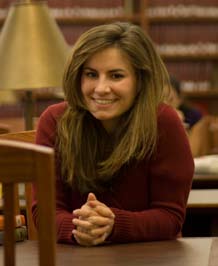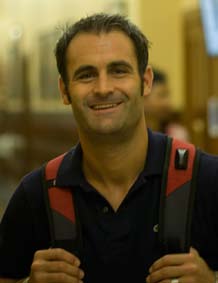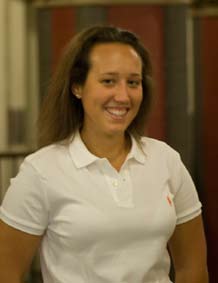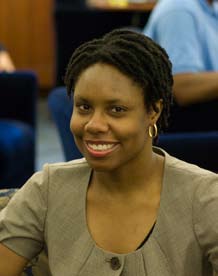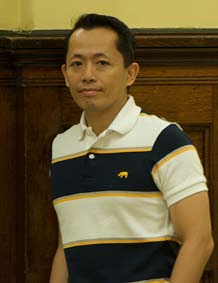Welcoming a Diverse Class
“Let me start by congratulating you on getting into one of the best and leading schools of education in the country, and in making the right choice in coming here.”
Those were TC President Susan Fuhrman’s opening words to the nearly 1,500 members of this year’s entering class at the New Student Experience/Orientation held in the
“Your experience here is not just about your scholarship but also about preparing you to work directly with our constituents out there,” she said, and went on to describe the College’s new partnerships with schools in Harlem and its growing list of collaborations with education ministries and schools in other countries.
She closed by advising the new students to “luxuriate in the opportunity to read and learn.
“Be self-indulgent intellectually,” she said. “As an undergraduate you were fulfilling college requirements, and in your jobs, you’ve had to meet the demands of the people you work for. But this is the time where you get to decide what you want to study, and that’s something that will guide you for the rest of your life.”
Fuhrman also sketched a quick demographic portrait of the entering class. (For the numbers, see the box below.) The following are portraits of six new TC students.
________________________________________________________________________________________
Tyler Whittenberg
Tyler Whittenberg is a third-generation reformer. His great uncle A. J. Whittenberg, a gas station owner, was a plaintiff in a 1963 NAACP federal suit that desegregated schools in
Whittenberg’s father, Charles, who was the first African American physician in
“Education is a social issue,” declares the intense 23-year-old, delivering a message he learned from his mother, Ernestine, a nurse who works with pregnant teens. “You can put all the money into a school and make it a brilliant school, but children don’t learn if they aren’t supported. You can’t just change the school. You have to change the communities.”
It was no surprise, then, that upon graduating from the
“I knew this was not going to be a joy ride,” he recalls.
Indeed, the experience only reinforced Whittenberg’s belief that
Whittenberg wants a “politically active” career, but not a career in politics. To be a politician, he says, “you have to take favors and do favors.” Instead he would like to run a nonprofit organization, perhaps a foundation, which can help diagnose what’s wrong with
Whittenberg begins his studies this month at TC with three of the best policy thinkers in the country: Michael Rebell, Executive Director of the Campaign for Educational Equity; Douglas Ready, a sociologist and Assistant Professor of Education, whose research examines the influence of educational policies and practices on educational equity and access; and Jeffrey Henig, Professor of Political Science and author of Spin Cycle: How Research Is Used in Policy Debates, The Case of Charter Schools, (Russell Sage Foundation/The Century Foundation, 2008). For Tyler Whittenberg, studying with these faculty members is part of fulfilling a dream. “I’m in class with the leaders in their fields,” he says. “It’s surreal to be here.”
________________________________________________________________________________________
Michelle Grappo
Michelle Grappo began a long-distance relationship with Teachers College when she was teaching special needs children at an American International School (AIS) in the Arab country,
Grappo should know. She has lived more than half of her 25 years abroad, including in
Diversity was the hallmark of Grappo’s years attending, and then teaching in, the AIS system. “You’re going to have at least a class of 20, and at least 10 different nationalities,” Grappo says. “You see kids from countries that have political problems playing together beautifully.”
Her plan now is to get a master’s degree in school psychology and return to the
Grappo would first look to hire among Teachers College alumni. “It is such a privilege, in my eyes, for clients to have access to affordable services from leading experts in the field.”
________________________________________________________________________________________
Kerry Johnson
Kerry Johnson will tell you flat out that she’s a major fan of Olivia the Pig,
True, her interest is somewhat professional. Johnson, a Harvard graduate in English literature, worked as an editor of children’s books and wrote promotional materials about them. If she sees a child on the subway open a book that she worked on at Harcourt, Inc. or HarperCollins Children’s Books, she can barely resist the urge to strike up a conversation.
But there’s a good chance she’d be up on Olivia’s doings anyway.
“I guess you could say I’m obsessed with reading,” laughs the 33-year-old native of
And on her down time? Well, the Teachers College Bookstore (on campus at the corner of
________________________________________________________________________________________
Chris McBride
As a long-time yoga teacher, Chris McBride knows how to engage his students’ bodies—but McBride, who graduated from the
“I never really was that passionate about yoga,” confesses the 32-year-old Vancouver native and first-year student in the master’s in elementary school education program. “I much prefer verbal interaction.”
McBride believes the best teachers engage the whole student—mind, body and heart. He looks forward to talking with students, even those of elementary school age, about ideas deeper and more profound than how to execute the perfect “downward-facing dog.” Yet he believes that if teachers in general are to have the opportunity to do that, he says, there will have to be major reform in public schools.
“Schools should be more caring about developing the whole human being,” he says, which, in his view, would include more arts, nutrition and physical education. Above all, “there should be more heart in education”—a concept with which no good yoga teacher would dissent.
________________________________________________________________________________________
Courtney Grzesikowski
Well before Courtney Grzesikowski was awarded her bachelor’s degree at the
Her reasons for choosing to do so at TC could be part of a mission statement for the College: “I am mainly interested in how research can affect policy change and how doing academic and scholarly work can be transformed into change at schools. I am mostly interested in policies related to equity, and education equity as a moral imperative.”
Clearly Grzesikowski has read TC’s Web site, but it was more than mere rhetoric that brought her here. Her undergraduate mentor, who knew people at TC, strongly encouraged her to come because he thought her research and policy interests were a good fit. (Coincidentally, University of Miami President Donna Shalala was a TC faculty member in the 1970’s and a mentor to Susan Fuhrman, TC’s President, when Fuhrman was in graduate school here.)
“It just came together that this was where I was supposed to be,” Grzesikowski says, “the City, the experience, the school’s reputation.” She is enrolled in the master’s program in special education and sociology, but fully intends to pursue a doctorate and then become a university professor, researcher, or both. She wants to work on “anything related to policy and equity issues. I would also be open to doing consulting, whether on a state or district level, or working for an education think tank.”
________________________________________________________________________________________
Robert Cortes
Robert Cortes barely clears five feet, but he seems taller when he explains why, at age 41, he left a 20-year teaching career in the
Five years ago, Cortes was a successful Latin and English teacher handling some administrative duties at Southridge, a private high school for boys in the Manilla suburb of
He knew it was the best fit, but “it was only now that I found the courage and the funding” to come to
He plans to earn a master’s degree and return to the Philippines ready to become a school administrator—but not before making the most of his TC experience, for which he left a good job, a good salary and his homeland.
Cortes takes an Aristotelian approach to the sacrifices he has made to come here. “Aristotle doesn’t equate happiness simply with emotional happiness, but rather, reaching in the end for that which you were made to be. Being here, being stretched to the limit—I may have moments of unhappiness here. But in the end I am moving toward the full potential of my intellect, and in that sense, I am happy.”
________________________________________________________________________________________
Fall 2008 incoming class
1,443 students, chosen from over 5,430 applicants—one of TC’s most selective classes ever.
11% are pursuing doctoral degrees, 89 percent are pursuing master degrees.
The oldest person is 67, the youngest is 20.
53% self-identified as non-white.
7.3% are citizens of another country.
82% are women, 18% percent men.
Collectively, the entering class represents 44
More come from
Collectively, the entering class represents 25 different countries other than the
Published Friday, Oct. 10, 2008
